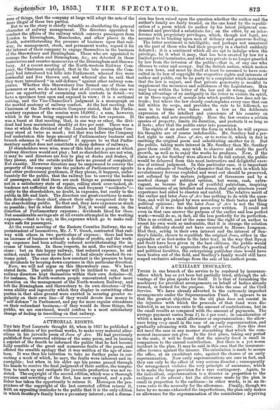Al7THORIAL RIGHTS.
Tire late Poet Laureate thought fit, when in 1837 he published a collected edition of his poetical works, to make very material alter- ations in his juvenile poem of Joan of Are. He had previously published four corrected editions of the same poem, and in issuing a reprint of the fourth he informed the public that he had become fully sensible of the great and numerous faults of the poem, and offered the sensible apology that it was written at the age of nine- teen. It was then his intention to take no further pains in cor- recting a work of which, he says, the faults were inherent and in- corrigible ; but when in his older age his poems passed through his hands to receive the final judgment of their author, the tempta- tion to touch up and castigate the juvenile production was not re- sisted. The copyright of the second edition, which was a thorough revision and rewriting of the first, has now expired, and a pub- lisher has taken the opportunity to reissue it. Hereupon the pro- prietors of the copyright of the last corrected edition reissue it, With an appealing reminder to the public that it is the only edition in which Southey' family have a pecunim'y interest ; and a discus- sion has been raised upon the question whether the author and the author's family are fairly treated, on the one hand by the republi- cation of a poem which its author by his latest judgment con- demned and provided a substitute for; on the other, by an inter- ference with proprietary privileges, which, though not legal, are assumed to be binding upon men of delicacy and generous feeling. The latter sentiment is intelligible, and perhaps not unnatural on the part of those who find their property in a chattel suddenly defeated; it is a sentiment which all are apt to indulge when the privilege, be it what it „may, that has been created by law for a limited period terminates, and what was private is no longer guarded by law from the invasion of the public—that is, of any one who chboses to enter and occupy. But the British nation, which makes its own laws, and must by itself at least be assumed to have con- sulted in its law. of copyright the respective rights and interests of author and public, can be no party to a complaint which insinuates that the law is unjust, and that private generosity is needful to supplement the meanness and selfishness of the Legislature. Men may keep within the letter of the law and do wrong, either by taking advantage of an ambiguity in the letter to violate its spirit, or in those regions of morals into which positive law does not in- trude; but where the law clearly contemplates every case that can fall within its scope, and provides the rule to be followed, no man is to blame who takes such a law as the deliberate expression of the intellect and conscience of his country on the matter, and acts accordingly. Here the law creates a certain species of property, limits its duration, and protects it so long as it lasts ; after that the public enter into possession. The rights of an author over the form in which he will express his thoughts are of course indefeasible. Mr. Southey had a per- fect right to omit .Toan of Are, or to revise it, which in fact is omitting the original poem and substituting another for it. But the public, taking more interest in Mr. Southey than Mr. Southey gave them credit for, may wish to observe and study the poet's growth, as well as to enjoy the works he produces. Now, if the claim set up for Southey were allowed to its full extent, the publics would be debarred from this most instructive and delightfurexer- cise of critical judgment. In this particular case, it is important to a due estimate of Southey's character that the work in which his revolutionary fervour exploded and went out should be preserved, not softened by the mature judgment of threescore and by a marked change of political. opinion, but warm, rash, extra- vagant, as became the glow of youthful patriotism, inspiring the conclusions of an intellect and reason that only nineteen years' experience had aided to chasten and unfold. The relative merit of the earlier and later Joan of Arc has nothing to do with the ques- tion, and will be judged by men according to their tastes and their political opinions ; but the later Joan of Arc is not the thing wanted, if it were the noblest poem ever written. It could not even in that case answer the purpose of the earlier and less perfect work—would do so, in fact, all the leas perfectly for its perfection. This is so evident, and at the same time the right of an author to recast his own work so undeniable, that it is strange the solution of the difficulty should not have occurred to Messrs. Longman Had they, acting in their own interest and the interest onnalLon- they's family, chosen to republish the original Joan, either in the appendix or as foot-notes to the later text, in the way that Byron and Scott have been given in the best editions, the public would have been enabled to appreciate the growth of Southey's poetical and political faculties, the enterprising publisher class would have been beaten out of the field, and Southey's family would still have reaped exclusive advantage from the sale of his earliest poem.


























 Previous page
Previous page